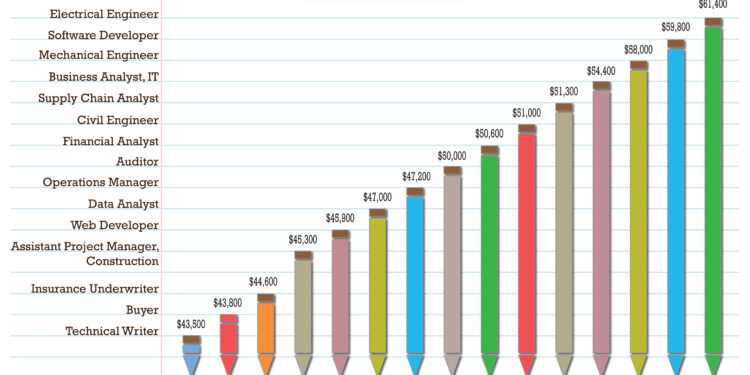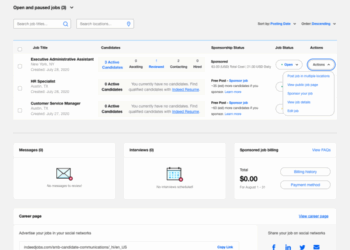Exploring the landscape of education in 2025 unveils a dynamic shift towards new opportunities and challenges. As the education sector evolves with technology and changing demands, certain job roles stand out as particularly rewarding and promising for the future. Let's delve into the most sought-after positions in education for 2025.
As we navigate through the anticipated trends and developments in education, it becomes evident that certain roles will hold significant value and offer exceptional fulfillment in the coming years.
Overview of the Education Sector in 2025
In 2025, the education sector is poised to undergo significant transformations driven by various trends and developments. With the rapid advancement of technology and changing educational needs, the landscape of jobs in education is expected to evolve accordingly.
Projected Trends and Developments
- Increased focus on personalized learning: With the integration of AI and data analytics, education in 2025 will be more tailored to individual students' needs and learning styles.
- Rise of online and hybrid learning: The popularity of remote learning options will continue to grow, offering flexibility and accessibility to students worldwide.
- Emphasis on STEAM education: Science, Technology, Engineering, Arts, and Mathematics (STEAM) subjects will be at the forefront of curriculum development to prepare students for future workforce demands.
Key Factors Influencing the Job Landscape
- Technology integration: Educators will need to adapt to new tools and platforms to enhance teaching methods and student engagement.
- Demographic shifts: Changing student demographics and needs will require educators to be more culturally competent and inclusive in their approach.
- Lifelong learning: The demand for continuous upskilling and reskilling will create opportunities for educators to specialize in adult education and professional development.
Impact of Technology Advancements
- Virtual reality and augmented reality: These technologies will revolutionize experiential learning, allowing students to immerse themselves in virtual environments for hands-on practice.
- Big data and analytics: Educators will leverage data insights to track student progress, identify learning gaps, and tailor instructional strategies for better outcomes.
- Artificial intelligence: AI-powered tools will automate administrative tasks, provide personalized learning recommendations, and support educators in creating adaptive lesson plans.
Emerging Roles in Education
In the rapidly evolving landscape of education, new job roles are emerging to meet the demands of the future. These roles are shaped by advancements in technology and the changing needs of students in the digital age.Exponential growth in technology has paved the way for exciting opportunities in the education sector.
Jobs that were once unheard of are now becoming mainstream, thanks to the integration of AI, VR, and AR in educational settings. These technologies are revolutionizing the way students learn and interact with content, creating a need for professionals who can navigate these digital tools effectively.
Data Analysts in Education
Data analysts play a crucial role in education by collecting, analyzing, and interpreting data to improve student outcomes. By leveraging AI and machine learning algorithms, data analysts can provide valuable insights into student performance, learning trends, and areas for improvement.
This data-driven approach helps educators tailor their teaching methods to meet the individual needs of students.
Virtual Reality Curriculum Developers
As VR technology becomes more accessible, the demand for virtual reality curriculum developers is on the rise. These professionals design immersive learning experiences that allow students to explore complex concepts in a simulated environment. By incorporating VR into the curriculum, educators can enhance student engagement and retention, making learning more interactive and impactful.
Augmented Reality Instructional Designers
Augmented reality instructional designers are tasked with creating AR-enhanced learning materials that blend the physical and digital worlds. By superimposing digital content onto real-world objects, AR technology provides a unique learning experience that promotes hands-on exploration and critical thinking. These professionals are essential in developing innovative educational resources that cater to diverse learning styles.
Soft Skills Coaches
In addition to technical expertise, soft skills such as communication, collaboration, and adaptability are becoming increasingly important in the education sector. Soft skills coaches help students develop these essential competencies, preparing them for success in the future job market
. By focusing on holistic development, these professionals ensure that students are equipped with the skills they need to thrive in a rapidly changing world.
Highly Rewarding Jobs in Education
When it comes to highly rewarding jobs in education, there are several positions that are anticipated to be prominent in 2025. These roles not only offer competitive salaries but also provide high levels of job satisfaction due to their impact on shaping the future generation.
Educational Technology Specialist
An Educational Technology Specialist is a key role in 2025, responsible for integrating technology into the classroom to enhance learning experiences. They work closely with teachers to develop innovative teaching methods and digital resources. With the increasing importance of technology in education, this role offers a competitive salary along with immense job satisfaction.
School Counselor
School Counselors play a crucial role in supporting students' social, emotional, and academic development. They provide guidance, counseling, and support to help students navigate challenges and make informed decisions about their future. School Counselors are highly valued for their impact on students' well-being and success, making this role both rewarding and fulfilling.
School Principal
School Principals are leaders who oversee the overall functioning of a school, including curriculum development, staff management, and student discipline. They play a vital role in creating a positive learning environment and ensuring the school's success. School Principals are well-compensated for their leadership and managerial skills, making this role highly rewarding in the education sector.
Professional Development and Growth Opportunities
In the dynamic field of education, professional development and growth opportunities are crucial for educators to stay competitive and relevant in their careers. By 2025, there will be a shift towards more innovative pathways for career advancement, offering educators a variety of options to excel in their roles.
Traditional Education Pathways vs. Innovative Routes
Traditionally, educators pursued advanced degrees or certifications to enhance their skills and knowledge. While these pathways are still valuable, newer, innovative routes are emerging in the education sector. These include:
- Micro-credentialing programs: Short, focused courses that provide specific skills and knowledge in areas such as technology integration, cultural competency, and personalized learning.
- Virtual professional development: Online workshops, webinars, and conferences that allow educators to connect with experts and peers from around the world.
- Project-based learning experiences: Collaborative projects and research opportunities that promote hands-on learning and innovation in teaching practices.
Staying Competitive in the Evolving Landscape
As the education landscape continues to evolve, educators must adapt to stay competitive. Here are some strategies for staying relevant in 2025:
- Continuous learning: Engage in ongoing professional development to keep up with the latest trends and best practices in education.
- Networking: Build strong professional relationships with colleagues, mentors, and industry experts to share ideas and collaborate on innovative projects.
- Embracing technology: Develop digital literacy skills and explore new educational technologies to enhance teaching and learning experiences.
- Cultural competence: Stay informed about diverse cultural perspectives and incorporate inclusive practices to support all students in the classroom.
Summary
In conclusion, the future of education presents a plethora of exciting prospects for those looking to make a meaningful impact in the field. From innovative teaching positions to leadership roles driving change, the most rewarding jobs in education for 2025 are as diverse as they are fulfilling.
Embrace the evolving landscape and embark on a journey towards a rewarding career in education.
Essential FAQs
What are the key factors influencing the job landscape in education for 2025?
The key factors include technological advancements, changing educational needs, and a shift towards personalized learning.
Which soft skills are particularly important for future job roles in education?
Soft skills such as adaptability, communication, and creativity will be crucial for success in the evolving education industry.
What salary prospects can educators anticipate in the highly rewarding jobs for 2025?
Salaries for these roles are expected to be competitive, reflecting the value and demand for skilled professionals in the field.











